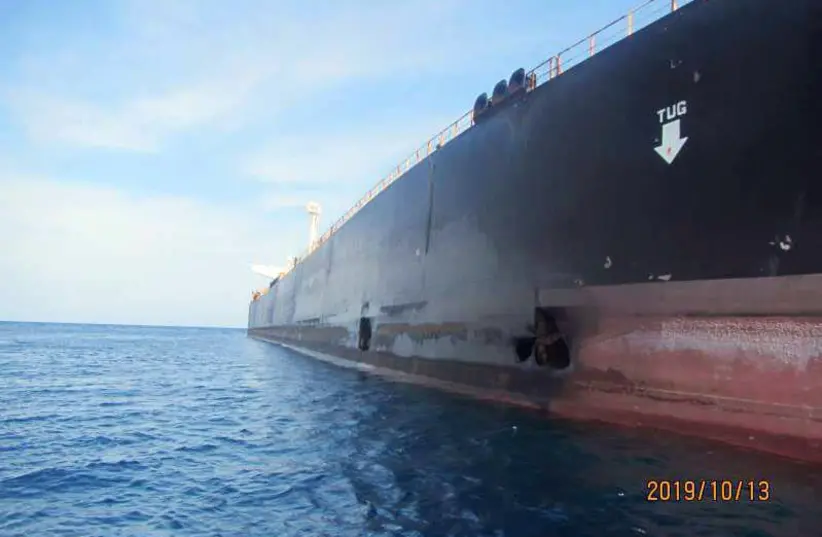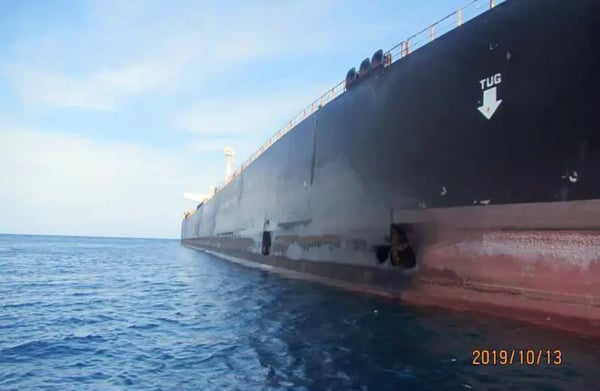Recent tensions at sea include allegations by Iran that Israel has carried out an attack on one of its cargo ships in the Mediterranean.
Israel had accused Iran of attacking an Israeli-owned ship in the Gulf of Oman in February. This builds on two years of attacks on ships and the seizing of ships by Iran and other countries.
A recent report in The Wall Street Journal that Israel has carried out “at least” a dozen attacks on Iranian ships heading to Syria changes the broader context of naval tensions in the region. This is because the report alleges the attacks began in late 2019. There were three attacks in 2019 and six in 2020, the report claims.
Some other interesting details have emerged. The National Iranian Oil Company appears to have supplied an image of a damaged tanker from 2019 and another image of the tanker Sabiti. Tehran has also trotted out a representative from the Islamic Republic of Iran Shipping Line Group to claim
a ship was attacked on March 10.
Back in May 2019, US secretary of state Mike Pompeo made a surprise visit to Iraq, warning of Iranian attacks. Four days later, limpet mines were used to damage four ships off the UAE Port of Fujairah, which is in the Gulf of Oman. Investigations concluded that there were strong indications the four attacks were part of a sophisticated and coordinated operation carried out with significant operational capacity.
A month later, the Front Altair and Kokuka Courageous were in the Gulf of Oman off Iran and were also attacked. US Central Command later released footage showing an IRGC patrol boat removing an unexploded limpet mine from one of the ships and alleging the IRGC had placed the mines in the first place.
The attacks on the ships in May and June were unique. Ships are not usually attacked with mines in this highly sensitive trade corridor. Iran has usually conducted other types of operations, such as using IRGC fast boats to harass US and other ships.
What is interesting in the Journal report is the allegation that “in an episode last month, suspected Israeli operatives attached a limpet mine to attack an Iranian vessel as it anchored near Lebanon to deliver Iran oil to Syria,” according to the first shipping professional. Israel’s military declined to comment on the incident.
LIMPET MINES are typically attached secretly to the hull of ships in port and detonated later, blowing holes in the sides of the vessels. It’s difficult to understand from the sources noted in the Journal piece if it is Iran that is alleging Israel has been attacking its ships. It appears that since the Islamic Republic subsequently claimed a ship was attacked a day after the article came out, Iran is seeking to leverage this.
Overall, naval tensions have increased dramatically since the 2019 incidents. These include harassment of US ships in 2019 and 2020 to the point that US president Donald Trump threatened to sink Iranian naval ships. There was also the US decision to seize petroleum aboard Iranian vessels bound for Venezuela, as well as the Iranian decisions to seize a British ship in July 2019 and a South Korean ship in January 2021.
Iran has shown that it is willing to seize ships to get back either its own ships or to get back frozen assets it wants. It does the same seizing Western hostages. However, when it comes to attacks on ships, Iran’s strategy is more complex.
It harasses US warships and films them using drones. It also traffics munitions to the Houthis in Yemen. It has sought to increase the range of its navy and of its drones and missiles, including targeting vessels at sea during war games.
The Journal story alleging three Israeli attacks in 2020 and six in 2021 changes somewhat the perception of the naval tensions in the region. That Iran remained quiet about these alleged attacks until March 12 leaves many questions about why it waited until now to discuss them.
Is it to distract from the fact that Iran is accused of the attack on the
Israeli-owned ship Helios Ray on February 26? Is it to distract from allegations that it is responsible for an oil spill off the coast of Israel in February?
What is clear from the story is that a shadowy naval conflict has been taking place over the last several years in the region, one that the public is only partially privy to.
Source: The Jerusalem Post

